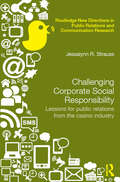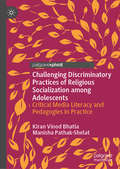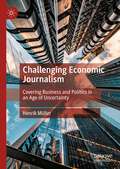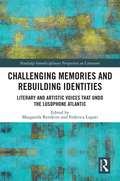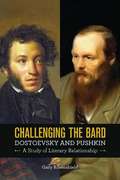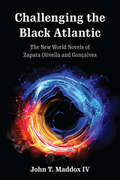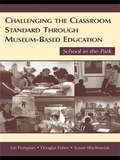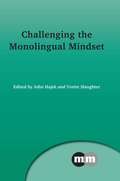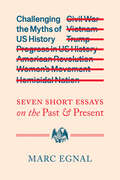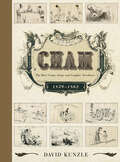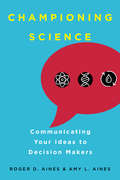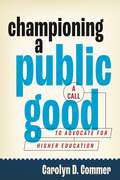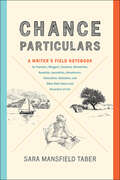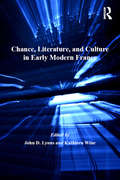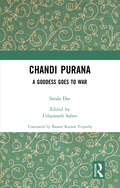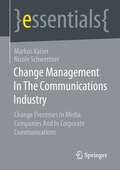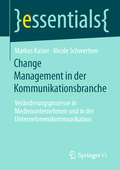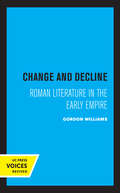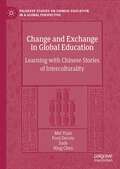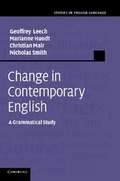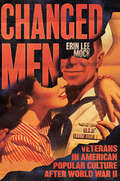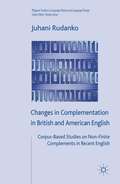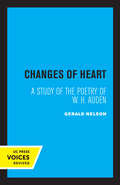- Table View
- List View
Challenging Corporate Social Responsibility: Lessons for public relations from the casino industry (Routledge New Directions in PR & Communication Research)
by Jessalynn R. StraussThe concept of Corporate Social Responsibility (CSR) has become increasingly widespread, as businesses seek to incorporate socially responsible behaviors while still being accountable to shareholders. Indeed some research has suggested that CSR in itself can form the basis of good PR by promoting consumers’ purchase decisions. Arguing that this approach is a dangerous oversimplification, this book takes a deeper look at the concept of CSR in a particularly challenging context - casino gaming. Originally the province of seedy, backdoor establishments in isolated cities, casino gaming has become a multibillion-dollar global industry. Drawing on in-depth research in Las Vegas, this unique study examines how and why corporations in the casino industry interpret and engage in CSR through community support, environmental issues, labor rights, and corporate governance. Through in-depth analysis of CSR in this industry, this book adds a new dimension to the debate on the role of CSR and public relations in business. Given the burgeoning relationship between CSR and corporate PR, the book seeks to illuminate CSR’s complexities, contradictions, and moral obligations. It will be of interest to all scholars of public relations, corporate communications, and corporate reputation.
Challenging Discriminatory Practices of Religious Socialization among Adolescents: Critical Media Literacy and Pedagogies in Practice
by Kiran Vinod Bhatia Manisha Pathak-ShelatThis book examines how religion operates as an institution of governance and discipline in society. The authors unravel the ways in which adolescents are socialized into adhering to the dictates of their religious identities, which often translates into practices of micro-aggression enacted in and through their interaction with the ‘religious other’ in schools and classrooms. Through ethnographic immersion in villages in the Gujarat, the authors identify media as a powerful source through which the dominant ideology of religious discrimination is perpetuated among adolescents. Subsequently, a critical media education framework was developed in order to equip these young people with the critical skills needed to challenge power relations, with the goal being to identify resources for resistance within themselves and their immediate media environments. Using pedagogic techniques such as spatial and cultural mapping, content creation and applied theatre practices to create a reflective yet practical guide, the findings of this book can be applied to a wide range of socio-cultural contexts.
Challenging Economic Journalism: Covering Business and Politics in an Age of Uncertainty
by Henrik MüllerThis book, inspired partly by journalism's failure to raise early warning flags in the run up to financial crises and by the rise of (economic) populism in recent years, puts forward a framework for economic journalism. It argues that that independent quality economic journalism is essential to the functioning of both the market and democracy but is under threat, and explores questions raised by the decline of media trust: what is the value of economic journalism? And how can journalists change their practices to counter this decline? The book takes a global approach with one chapter focusing on European integration and concludes with an outlook on the future of economic journalism, and the financing of journalism more widely.
Challenging Memories and Rebuilding Identities: Literary and Artistic Voices that undo the Lusophone Atlantic (Routledge Interdisciplinary Perspectives on Literature)
by Margarida Rendeiro Federica LupatiTaking an original approach, Challenging Memories and Rebuilding Identities: Literary and Artistic Voices that undo the Lusophone Atlantic explores a selected body of cultural works from Portugal, Brazil and Lusophone Africa. Contributors from various fields of expertise examine the ways contemporary writers, artists, directors, and musicians explore canonical forms in visual arts, cinema, music and literature, and introduce innovation in their narratives, at the same time they discuss the social and historical context they belong to.
Challenging the Bard
by Gary RosenshieldWhen geniuses meet, something extraordinary happens, like lightning produced from colliding clouds, observed Russian poet Alexander Blok. There is perhaps no literary collision more fascinating and deserving of study than the relationship between Alexander Pushkin (1799 1837), Russias greatest poet, and Fyodor Dostoevsky (1821 81), its greatest prose writer. In the twentieth century, Pushkin, "Russias Shakespeare," became enormously influential, his literary successors universally acknowledging and venerating his achievements. In the nineteenth century, however, it was Dostoevsky more than any other Russian writer who wrestled with Pushkins legacy as cultural icon and writer. Though he idolized Pushkin in his later years, the younger Dostoevsky exhibited a much more contentious relationship with his eminent precursor. In Challenging the Bard, Gary Rosenshield engages with the critical histories of these two literary titans, illuminating how Dostoevsky reacted to, challenged, adapted, and ultimately transformed the work of his predecessor Pushkin. Focusing primarily on Dostoevskys works through 1866 including Poor Folk, The Double, Mr. Prokharchin, The Gambler, and Crime and Punishment Rosenshield observes that the younger writers way to literary greatness was not around Pushkin, but through him. By examining each literary figure in terms of the other, Rosenshield demonstrates how Dostoevsky both deviates from and honors the work of Pushkin. At its core, Challenging the Bard offers a unique perspective on the poetry of the master, Pushkin, the prose of his successor, Dostoevsky, and the nature of literary influence.
Challenging the Black Atlantic: The New World Novels of Zapata Olivella and Gonçalves
by John T. IVThe historical novels of Manuel Zapata Olivella and Ana Maria Gonçalves map black journeys from Africa to the Americas in a way that challenges the Black Atlantic paradigm that has become synonymous with cosmopolitan African diaspora studies. Unlike Paul Gilroy, who coined the term and based it on W.E.B. DuBois’s double consciousness, Zapata, in Changó el gran putas (1983), creates an empowering mythology that reframes black resistance in Colombia, Haiti, Mexico, Brazil, and the United States. In Um defeito de cor (2006), Gonçalves imagines the survival strategies of a legendary woman said to be the mother of black abolitionist poet Luís Gama and a conspirator in an African Muslim-led revolt in Brazil’s “Black Rome.” These novels show differing visions of revolution, black community, femininity, sexuality, and captivity. They skillfully reveal how events preceding the UNESCO Decade of Afro-Descent (2015-2024) alter our understanding of Afro-Latin America as it gains increased visibility. Published by Bucknell University Press. Distributed worldwide by Rutgers University Press.
Challenging the Classroom Standard Through Museum-based Education: School in the Park
by Douglas Fisher Susan Wachowiak Ian PumpianSchool in the Park is an innovative museum-based educational effort to engage students in their community during the school day. Since 1999 several hundred students have been educated each year in museums and the zoo in San Diego. This is more than a field trip, it is changing the way that education is provided.Challenging the Classroom Standard Through Museum-Based Education: School in the Park presents the experience of School in the Park from the perspective of different disciplines--oral language, reading, writing, social studies, math, science, and the arts--to determine how students are learning content within museums and the zoo. It provides a number of examples, case studies, references, scenarios, and recommendations for teaching and learning outside of the traditional classroom. The perspectives of teachers, museum educators, and students are represented. Importantly, this book offers ideas that readers can use in their own communities, ranging from long-term partnering with cultural institutions to one-day trips, to ensure that students have authentic experiences with the curriculum.With the current increased focus on accountability and achievement, less attention and importance is given to community-based learning experiences. This book demonstrates the viability of merging formal and informal learning and using community venues as an extension of the classroom. All those interested in and charged with educating children will find this book useful in exploring powerful learning experiences that occur outside traditional classroom settings.
Challenging the Monolingual Mindset
by John Hajek Yvette SlaughterThis volume illustrates the distinctive and interconnected use of languages in increasingly diversified communities, examining a range of multilingual contexts, including post-migration settlement, language policy, education, language contact and intercultural communication. With contributions from researchers in Australia, Europe and Asia, the book discusses the opportunities and tensions that can emerge when societies attempt to manage and understand multilingual communication within and across communities. Reflecting the ideas of Professor Michael Clyne, the volume makes clear how ongoing research across a broad range of topics can assist in challenging the monolingual mindset by bringing to the attention of readers the rich linguistic diversity, as well as linguistic potential, of our communities around the world.
Challenging the Myths of US History: Seven Short Essays on the Past and Present
by Marc EgnalA provocative, critical take on the traditional narrative of US history—and a call to reimagine America's past. According to textbooks, the media, and politicians of all stripes, the story of the United States is one of steady progress toward a "more perfect union." In this narrative, ideals of liberty and freedom explain the Revolution and the Civil War and drove racial progress. Similarly, foreign policy, if marked by stumbles, has been largely well-intentioned. In seven pithy and provocative essays, historian Marc Egnal challenges this account. He argues that wealthy individuals who were set on economic and territorial expansion shaped the American narrative. The seven essays look at progress in the writing of history, the Revolution, the Civil War, violence, Vietnam, the women's movement, and the rise of Donald Trump. Egnal does not ignore protests and lofty ideals. Instead, he shows they were subordinate to the plans of the expansionists and to the racism that so often accompanied their designs. Accessible and engaging, Challenging the Myths of US History urges readers to question long-held assumptions and to look at the American past from a very different perspective.
Cham: The Best Comic Strips and Graphic Novelettes, 1839–1862
by David KunzleCham, real name Count Amédée de Noé and a serious rival to Daumier, may have been the epitome of a célèbre inconnu, a famous unknown. He is one much deserving, at last, of this first account of his huge oeuvre as a caricaturist.This book concentrates on his mastery of the important newcomer to the field of caricature, which we call comic strip, picture story, and graphic novel. The volume features facsimiles of nearly twenty of these from 1839 to 1863 and ranging from one page to forty (this last a parody of Victor Hugo’s Les Misérables). In addition, summaries and sample illustrations of twenty-seven “minor works” demonstrate that Cham is by far the most important specialist of what was then a new genre in Europe.Born to an ancient aristocratic family, Cham was from early on wholly dedicated to an art considered far beneath his class. Starting as a disciple of the father of the modern comic strip, Swiss Rodolphe Töpffer, Cham soon launched out on his own, evolving an original form of comedy, his own comédie humaine, farcical, absurd, and parodic. His productivity was legendary and comprised all the known genres of caricature, the full-page cartoon lithograph, the thematic seasonal group, weekly and monthly humorous comment (much like the daily newspaper cartoonist today), and a feature called the Revue Comique, which made him the supreme graphic journalist of his day.Hitherto unknown correspondence reveals an attractive personality who was fond of animals and who honored a low-class woman he eventually made his countess. Vaunted comics scholar David Kunzle has created a fitting tribute to Cham’s impact and genius.
Chamorro Alphabet (Island Alphabet Books)
by Lori PhillipsThis book is part of the Island Alphabet Books series, which features languages and children's artwork form the U.S.-affiliated Pacific. Each book contains the complete alphabet for the language, four or five examples for each letter, and a word list with English translations.
Championing Science: Communicating Your Ideas to Decision Makers
by Roger D. Aines Amy L. AinesChampioning Science shows scientists how to persuasively communicate complex scientific ideas to decision makers in government, industry, and education. This comprehensive guide provides real-world strategies to help scientists develop the essential communication, influence, and relationship-building skills needed to motivate nonexperts to understand and support their science. Instruction, interviews, and examples demonstrate how inspiring decision makers to act requires scientists to extract the essence of their work, craft clear messages, simplify visuals, bridge paradigm gaps, and tell compelling narratives. The authors bring these principles to life in the accounts of science champions such as Robert Millikan, Vannevar Bush, scientists at Caltech and MIT, and others. With Championing Science, scientists will learn how to use these vital skills to make an impact.
Championing a Public Good: A Call to Advocate for Higher Education (Rhetoric and Democratic Deliberation)
by Carolyn D. CommerFrom decreased funding to censorship controversies and rising student debt, the public perception of the value of higher education has become decidedly more negative. This crisis requires advocacy and action by policymakers, educators, and the public. Championing a Public Good presents a clear set of strategies and tools for advocates making the case for renewing our civic commitment to public higher education.Taking a fresh look at one of the most controversial moments in the history of US higher education, the work of the Spellings Commission (2005–2008), Carolyn D. Commer argues that this body’s public criticisms of higher education and its recommendation to increase accountability and oversight—via market-based metrics—accelerated the erosion of the concept of higher education as a public good. Countering that requires a careful, forceful approach on the part of advocates. Commer draws from the public record to demonstrate a common set of arguments, metaphors, and rhetorical frames that can, in fact, flip the public debate over higher education to champion the public value of universities and colleges over their value as market commodities.Championing a Public Good is a powerful primer on how to change the course of public higher education in the United States. It will appeal especially to faculty, administrators, and policymakers in higher education.
Chance Particulars: A Writer's Field Notebook for Travelers, Bloggers, Essayists, Memoirists, Novelists, Journalists, Adventurers, Naturalists, Sketchers, and Other Note-Takers and Recorders of Life
by Sara Mansfield TaberAn essential guide for writers on how to record and use rich detail to enliven their work.The goal of the writer is to live with the keenness of the foreigner. To experience, wide-eyed, the sensations aroused and the events offered up by peculiar surrounds and then to evoke them so brightly on the page that the reader, too, experiences the foreigner’s frisson. A time-honored way this is accomplished is through the keeping of a field notebook—through the faithful recording of the this-and-that of life; the atmospheres and incidents; the bells, the beer, the bread.Based on what accomplished nonfiction writer Sara Mansfield Taber learned in her many years of field notebook keeping, Chance Particulars is a unique and handy primer for writers who want to use their experiences to tell a lively, satisfying story. Often, writers try to turn their notes into a memoir, essay, travel piece, or story, only to find that they haven’t recorded enough of the concrete, sensory details necessary to create evocative description. To help writers overcome this problem, Taber has composed a true "field notebook for field notebook keepers." Enhanced by beautiful illustrations, this charming and comprehensive guide is a practical manual for anyone who wishes to learn or hone the crafts of writing, ethnography, or journalism.Writers of all levels, genres, and ages, as well as teachers of writing, will appreciate this useful tool for learning how to record the details that build vibrant prose. With this book in hand, you will be able to recreate times and places, conjure up intricate character portraits, and paint pictures of particular landscapes, cultures, and locales.
Chance Particulars: A Writer's Field Notebook for Travelers, Bloggers, Essayists, Memoirists, Novelists, Journalists, Adventurers, Naturalists, Sketchers, and Other Note-Takers and Recorders of Life
by Sara Mansfield Taber“A guide to paying attention to the concrete, sensory details of experience and the process of getting them down on the page.” —James Barilla, author of My Backyard JungleBased on what accomplished nonfiction writer Sara Mansfield Taber learned in her many years of field notebook keeping, Chance Particulars is a unique and handy primer for writers who want to use their experiences to tell a lively, satisfying story. Often, writers try to turn their notes into a memoir, essay, travel piece, or story, only to find that they haven’t recorded enough of details necessary to create evocative description. To help writers overcome this problem, Taber has composed a true “field notebook for field notebook keepers.” Enhanced by beautiful illustrations, this charming and comprehensive guide is a practical manual for anyone who wishes to learn or hone the crafts of writing, ethnography, or journalism.Writers of all levels, genres, and ages, as well as teachers of writing, will appreciate this useful tool for learning how to record the details that build vibrant prose. With this book in hand, you will be able to recreate times and places, conjure up intricate character portraits, and paint pictures of particular landscapes, cultures, and locales.“At once a delicious read and the distilled wisdom of a long-time teacher and virtuoso of the literary memoir. Her powerful lessons will give you rare and vital skills: to be able to read the world around you, and to read other writers, as a writer, that is, with your beadiest conjurer’s eye and mammoth heart. This is a book to savor, to engage with, and to reread, again and again.” —C. M. Mayo, author of Miraculous Air
Chance, Literature, and Culture in Early Modern France
by John D. LyonsIn the Renaissance and early modern periods, there were lively controversies over why things happen. Central to these debates was the troubling idea that things could simply happen by chance. In France, a major terrain of this intellectual debate, the chance hypothesis engaged writers coming from many different horizons: the ancient philosophies of Epicurus, the Stoa, and Aristotle, the renewed reading of the Bible in the wake of the Reformation, a fresh emphasis on direct, empirical observation of nature and society, the revival of dramatic tragedy with its paradoxical theme of the misfortunes that befall relatively good people, and growing introspective awareness of the somewhat arbitrary quality of consciousness itself. This volume is the first in English to offer a broad cultural and literary view of the field of chance in this period. The essays, by a distinguished team of scholars from the U.S., Britain, and France, cluster around four problems: Providence in Question, Aesthetics and Poetics of Chance, Law and Ethics, and Chance and its Remedies. Convincing and authoritative, this collection articulates a new and rich perspective on the culture of sixteenth- and seventeenth-century France.
Chandi Purana: A Goddess Goes to War
by Sarala DasThis book is the English version of Chandi Purana, written in Odia by Sarala Das. Indigenous and secular, the Chandi Purana is a shastra for laymen, a bold step towards fulfilling their right to knowledge. Based on the legend of Durga’s incarnation of Chandi, as narrated in the Vishnu Purana, Sarala Das’s Chandi Purana, written in Odia, marks the beginning of the era of classical Odia literature. It is not, however, just a renewed vernacular edition of an old story told in Sanskrit long ago; its objective is to communicate one of the great themes of Indian mythology to the common folk whom myth marginalizes and history excludes. And in doing so, the poet administers certain changes, based on local religions, beliefs, and customs. He introduces the Odia legend of Chandi by interpreting her as Sarala Chandi of Kanakpur, Odisha, where she has been ‘worshipped for one lakh and thirty-two thousand years of Kaliyuga’. Second, in Sanskrit texts, the story is told by Sage Medha to King Suratha and Samadhi Vaisya. In Chandi Purana, Sage Shuka is the narrator and King Parikshit is the listener, which reflects the poet’s adherence to Vaishnavism. Essentially, a war story, it presents Durga not only as a goddess in war, but also as a mother figure who tears apart the patriarchal frame in which women are treated as subordinates.
Change Management In The Communications Industry: Change Processes In Media Companies And In Corporate Communications (essentials)
by Markus Kaiser Nicole SchwertnerIn media companies and in corporate communications, digital channels are being added to traditional channels. The content is often produced in newsrooms. There is a growing awareness that communication measures are radically oriented towards the needs of the user. In these change processes, special emphasis must be placed on involving the employees. Because only then will the change process be economically successful. This essential shows why media companies and communication departments need a live change culture and how they can approach change systematically.
Change Management in der Kommunikationsbranche: Veränderungsprozesse in Medienunternehmen und in der Unternehmenskommunikation (essentials)
by Markus Kaiser Nicole SchwertnerIn Medienunternehmen und in der Unternehmenskommunikation kommen zu traditionellen Ausspielwegen digitale Kanäle hinzu. Die Inhalte werden oft in Newsrooms produziert. Es setzt sich das Bewusstsein durch, dass sich Kommunikationsmaßnahmen radikal am Bedürfnis des Users orientieren. Bei diesen Veränderungsprozessen muss ein besonderer Wert darauf gelegt werden, die Mitarbeiter mitzunehmen. Denn nur dann wird der Change-Prozess auch wirtschaftlich erfolgreich sein. In diesem essential wird aufgezeigt, warum Medienunternehmen und Kommunikationsabteilungen eine gelebte Change-Kultur brauchen und wie sie den Wandel systematisch angehen können.
Change and Decline: Roman Literature in the Early Empire (Sather Classical Lectures #45)
by Gordon WilliamsThis title is part of UC Press's Voices Revived program, which commemorates University of California Press’s mission to seek out and cultivate the brightest minds and give them voice, reach, and impact. Drawing on a backlist dating to 1893, Voices Revived makes high-quality, peer-reviewed scholarship accessible once again using print-on-demand technology. This title was originally published in 1978.
Change and Exchange in Global Education: Learning with Chinese Stories of Interculturality (Palgrave Studies on Chinese Education in a Global Perspective)
by Fred Dervin Sude Mei Yuan Ning ChenThis unique book starts from the premise that students, scholars, and educators should be given access to a form of global education that is genuinely global. Using the notion of interculturality as change and exchange as a basis, the authors examine fifty discourse instruments (e.g. idioms, neologisms, slogans) related to what they call ‘Chinese stories of interculturality’. China, like other countries, has a rich and complex history of intercultural encounters and her engagement with the notion today, which shares similarities and differences with glocal discourses of interculturality, deserves to be unpacked and familiarized with. By so doing, digging into the intricacies of the Chinese and English languages, the reader is empowered to unthink, rethink and especially reflect on their own take on the important notion of interculturality.
Change in Contemporary English: A Grammatical Study
by Geoffrey Leech Marianne Hundt Christian Mair Nicholas SmithBased on the systematic analysis of large amounts of computer-readable text, this book shows how the English language has been changing in the recent past, often in unexpected and previously undocumented ways. The study is based on a group of matching corpora, known as the 'Brown family' of corpora, supplemented by a range of other corpus materials, both written and spoken, drawn mainly from the later twentieth century. Among the matters receiving particular attention are the influence of American English on British English, the role of the press, the 'colloquialization' of written English, and a wide range of grammatical topics, including the modal auxiliaries, progressive, subjunctive, passive, genitive and relative clauses. These subjects build an overall picture of how English grammar is changing, and the linguistic and social factors that are contributing to this process.
Changed Men: Veterans in American Popular Culture after World War II (Cultural Frames, Framing Culture)
by Erin Lee MockPostwar culture and anxiety over the reintegration of veterans into American society Millions of GIs returned from overseas in 1945. A generation of men who had left their families and had learned to kill and to quickly dispatch sexual urges were rapidly reintegrated into civilian life, told to put the war behind them with cheer and confidence. Many veterans struggled, openly or privately, with this transition. Others in society wondered what the war had wrought in them. As Erin Lee Mock shows in this insightful book, the &“explosive&” potential of men became a central concern of postwar American culture. This wariness of veterans settled into a generalized anxiety over men&’s &“inherent&” violence and hypersexuality, which increasingly came to define masculinity. Changed Men engages with studies of film, media, literature, and gender and sexuality to advance a new perspective on the artistic and cultural output of and about the &“Greatest Generation,&” arguing that depictions of men&’s violent and erotic potential emerged differently in different forms and genres but nonetheless permeated American culture in these years. Viewing this homecoming through the lenses of war and trauma, classical Hollywood, pulp fiction, periodical culture, and early television, Mock shows this history in a provocative new light.
Changes in Complementation in British and American English
by Juhani RudankoThe book shows how the system of English predicate complementation has been undergoing an amazing amount of variation and change in recent centuries, and identifies explanatory principles to account for this change and variation, with evidence from large electronic corpora of both British and American English.
Changes of Heart: A Study of the Poetry of W. H. Auden
by Gerald NelsonThis title is part of UC Press's Voices Revived program, which commemorates University of California Press’s mission to seek out and cultivate the brightest minds and give them voice, reach, and impact. Drawing on a backlist dating to 1893, Voices Revived makes high-quality, peer-reviewed scholarship accessible once again using print-on-demand technology. This title was originally published in 1969.
